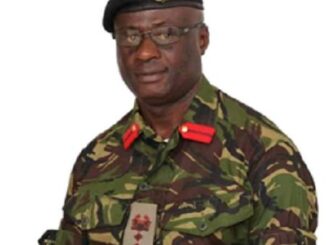
Speech delivered by the National Secretary-General of SLAJ, Mohamed Asmieu Bah, on the topic: “How the Right to Access Information Law Aids the Work of Journalists”, at the Society for Democratic Initiatives (SDI) One-Day Training Workshop for Public Information Officers from Government Ministries, Departments and Agencies, Media Practitioners, and Heads of Civil Society Organisations on the Right to Access Information Law and its Significance in Ensuring Transparency and Accountability During COVID-19.
Date: Tuesday, 9th February, 2021
Venue: Hill Valley Hotel, Signal Hill, Freetown
Time: 9am
Mr. Chairman, colleague journalists, information officers, distinguished guests, ladies, and gentlemen, please permit me to stand on existing protocols.
I bring you greetings from the Executive and membership of SLAJ. I am here to represent my President Ahmed Sahid Nasralla, who would have loved to be here, but for other matters so he asked me to step into his shoes. Before I proceed, let me confess his shoes are big and I don’t think my feet can fit in them, so don’t raise the bar too high for me.

Having said that Mr. Chairman, when my president asked me to represent him and he forwarded the topic to me, I said to myself such a topic “How the Right to Access Information Law Aids the Work of Journalists” could not have come at a better time than now, when the post repeal of Part Five of the Public Order Act of 1965 was expected to open a floodgate of investigative stories by journalists, but how to go about accessing certain information is what many journalists have been struggling with, the reason RAIC last year in collaboration with SLAJ held a one-day training for journalists on how to access information from public institutions.
From our findings since then, many journalists have sought information from public institutions using the right method, and where that public institution failed to provide the information within the stipulated time, fines have been levied. In the recent cases involving the Bank of Sierra Leone and the Ministry of Health, the commission had no option but to reference the RAIC Act to the two institutions. The fines levied on these two institutions have sent a louder message that it is no more business as usual, where the door is shut at the journalist and no one is there to speak to him/her. In years gone by this was not dreamt of let alone seen to be done.
I want to focus my presentation on the work of investigative journalists which is gradually dwindling in our media profession. These days, many journalists prefer to go for the soft and episodic reporting, where we come to an organized workshop, listen to the speeches and get an angle to write our news stories. The next day you read the newspapers or listen to the radio or television and hear very catchy headlines, but what we fail to do is to engage in thematic reporting which involves time and resources, and many a time our newsrooms find it difficult to avail the journalist the wherewithal to embark on groundbreaking investigative work. This method of reporting is indeed arduous, time-consuming, and is not done in haste, because one has to be very careful before one goes to press as we say in our media parlance. It is not the one who first breaks the news that matters, but the one whose news meets the professional threshold of accuracy, fairness, balance, and depth.
Now, who is an investigative journalist? George Orwell in one of his famous sayings said and I quote: “Journalism is printing what someone else does not want to be printed, everything else is public relations.’’ Let’s ask ourselves for the purpose of this discussion, have we been printing what someone else does not want to be printed, more often than not we don’t. There are myriad reasons for that, which may include but not limited to vested interests including politics, or financial, or religious and tribal biases.
One of the difficulties facing journalists in Sierra Leone when doing certain stories, especially one that involves holders of public offices, is to access certain information that will aid the work of the journalist. The passing into law of the Access to Information in 2013, gave media practitioners a golden opportunity to embark on investigative journalism, and reduce the limitations journalists and researchers face whenever they embark on the journey of investigating a story, especially one that exposes corruption or other forms of abuse of office. Journalism is at its best when stories are dominated by investigative works, where this is not applicable we become public relation experts which you will agree with me is a strange bedfellow to investigative journalism.
Let’s face it, before now accessing information from public officials was almost impossible, because of the code of secrecy that prevents civil servants to speak to the media. The Right to Access to Information law has given the journalist the legal tools to unlock some of those areas that were once viewed as a citadel of secrecy.
The investigative journalist who follows certain stories to see their logical conclusion relies on the RAI law. To access certain information especially when they are not under the exempt information which talks about national security and defence, International Relations, Economic Interests, Investigations, and law enforcement among others, not to run the risk of defamation which can attract litigation against the journalist.
The passing of the RAIC law has given the journalist more scope to hold leaders accountable without fear of being charged to court as it used to happen under the old Criminal Libel Law where even truth was not a defence.
It is a known maxim that to whom much is given much is expected. Now, let me turn to my colleagues. I am sure the framers of the RAIC did not intend to give journalists blank cheque where they can just write to access any type of information and forget about the implications of releasing certain information.
Part Three of the Right to Access Information Act explicitly deals with the Exempt Information. Inter alia, one will not access information if that information can jeopardize the National security and defence of the State, cause a strain in Sierra Leone’s relations with other states, and undermines the country’s economic interests. This section is in no way to deprive the seeker of the information that he/she asked for, but it is meant to protect the state because if the state collapses, one will not practice one’s profession no matter what the profession is.
The next question is why the journalist should be given the information that he or she demands. A society that denies journalists the right to access information exposes itself to unconventional methods of accessing information, that is not to say those methods are all the time legal, but to some media practitioners, it is the last resort especially when the focus of the journalist is public interest.
We all know about the Panama Papers which were leaked database from a renowned leading global law firm providing services on the incorporation of offshore entities landed in the wrong hands, and the world was astonished by the revelation that followed.
As I end my presentation let me urge my colleague journalists to be doing more investigative work because that is where the true spirit of journalism lies. We have the laws and institutions that can help us achieve excellence in our noble profession. Let us challenge ourselves and demolish the glass ceiling as journalists.
I will end with a saying from one media scholar who said and I quote: “A journalist is the one who comforts the afflicted and afflict the comforted.”
I thank you.


